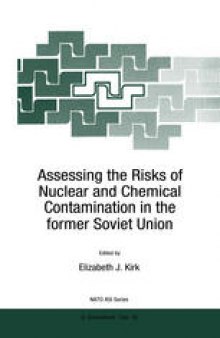 جزییات کتاب
جزییات کتاب
Risk assessment has come to assume acute importance in the former Soviet Union since money is so scarce, yet the needs for cleanup are so huge. Other factors contribute to this situation, too: New leaders are still emerging, and governmental structures are still evolving. This creates a particular difficulty for environmentalists who attempt to become involved in the risk assessment process. New information continues to surface on the fallout from Chernobyl and its consequences for human health. Scientists are still debating the effects of low doses of radiation delivered over a long period of time. This type of contamination is especially prevalent in the Russian North, for example, as a result of the dumping of nuclear submarine reactors into the Kara and Barents Seas. This book examines the complexities of risk assessment in the FSU at this unique time in history.



 دانلود کتاب
دانلود کتاب

 جزییات کتاب
جزییات کتاب





 این کتاب رو مطالعه کردید؟ نظر شما چیست؟
این کتاب رو مطالعه کردید؟ نظر شما چیست؟
